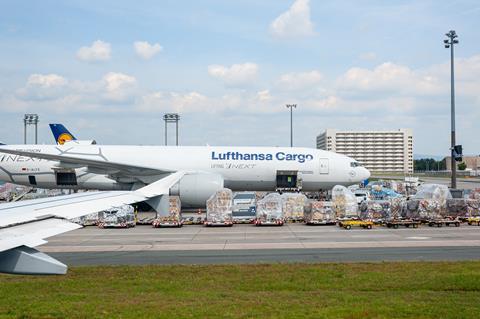Lufthansa Cargo will use 400 tonnes of Sustainable Aviation Fuel on behalf of Maersk in the remainder of 2024

AP Moller-Maersk and Lufthansa Cargo have signed an agreement to promote the decarbonisation of airfreight through the use of Sustainable Aviation Fuel (SAF).
Lufthansa will use 400 metric tonnes of SAF on behalf of Maersk in the remainder of 2024, seen as an ”important contribution” in the year-end business with traditionally high cargo volumes.
The expected reduction of CO2 emissions corresponds to at least 1,200 metric tonnes.
”Cutting greenhouse gas emissions from airfreight is one of the most challenging tasks within the decarbonisation of global logistics and supply chains,” said Morten Bo Christiansen, head of energy transition at Maersk. ”This is why we are excited to partner with Lufthansa Cargo in this important task.
”As one of the globally largest logistics companies, Maersk aims to reach net zero greenhouse gas emissions by 2040 across all modes of transport as well as other business areas like warehousing and container terminals.
”The uptake and availability of SAF in the aviation industry is still limited,” he explained. “Our agreement with Lufthansa Cargo enables Maersk to contribute to an increase in the uptake.”
Ashwin Bhat, CEO of Lufthansa Cargo, noted that SAF was a key technological enabler for more sustainable flying, and was essential for the energy transition in aviation.
”With Maersk we are jointly making a valuable contribution with the new agreement. At the same time, more sustainable flying also requires major efforts for a modern fleet and increased efficiency in flight operations,” Bhat outlined.
”It is only through this interplay that change can be achieved sustainably.”
Vessel arrival
Meanwhile, Maersk has celebrated the arrival of its newest dual-fuel methanol container vessel in Singapore, as part of her maiden voyage from Asia to Europe.
The vessel, named ’A.P. Møller’ in honour of Arnold Peter Møller, the founder of Maersk, is the ninth vessel in Maersk’s fleet capable of operating on methanol.
”Today marks a significant milestone in our journey of decarbonising the maritime industry,” said Murali Pillai, minister of state, ministry of law and ministry of transport for Singapore.
”The arrival of A.P. Møller in Singapore not only showcases the advancements in shipping technology but also reinforces our commitment to support solutions that can reduce greenhouse gas emissions.
”We are glad to collaborate with Maersk and look forward to furthering our efforts to make Singapore a leading hub for new maritime fuels,” he said.
A.P. Møller is part of a series of 18 large dual-fuel methanol vessels scheduled for delivery in 2024 and 2025.
Built at Hyundai Heavy Industries in Ulsan, South Korea, the ship can carry 16,592 standard containers (TEUs).
Seven of these large dual-fuel methanol vessels joined the Maersk fleet in 2024.
”Maersk is proud to introduce our newest dual-fuel methanol vessel in Singapore, home to Maersk Southeast Asia and Asia Pacific, and a key part of our Ocean network and integrated supply chain,” said Ditlev Blicher president of Asia Pacific at Maersk.
”This launch showcases our dedication to decarbonisation in the region.
”The energy transition of our industry is a joint-effort, and we are collaborating with authorities across the region, including Singapore, to advance decarbonisation initiatives,” Blicher noted.
”This effort is further supported by an increasing number of customers choosing our ECO Delivery solutions.
”Now, we urge the International Maritime Organisation to adopt regulations that close the price gap between fossil and new fuels, encouraging even more customers to come onboard,” he added.



